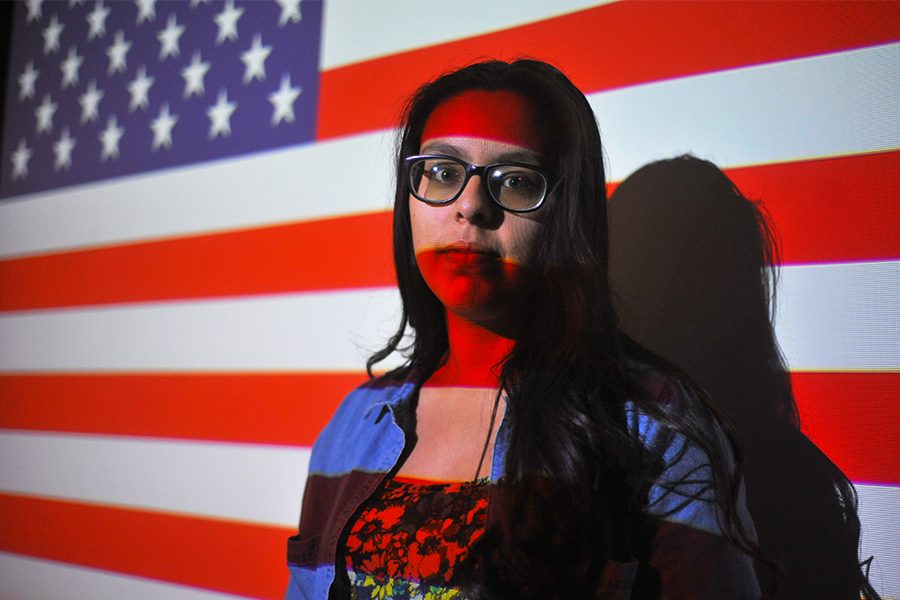Deportation fear stalls hope
Trump’s executive orders ban, target immigrants rights
Contra Costa College nursing major Leamsi Amaya was interrogated for an hour at Chicago O’Hare Airport after presenting her high school ID as identification while going through security there. Amaya feared showing her Mexican consular identification card and passport would get her deported back to Mexico.
Mar 29, 2017
Throughout the last year, the lives of undocumented students and their families have begun to fade into the shadows of obscurity and fear.
To meet his own campaign promises, Donald Trump has worked overtime, with no trepidation, to pass immigration policies that threaten the deportation of millions of people.
These tactics, which have instilled fear into the daily lives of those who make up the undocumented community, are sending shockwaves of paranoia through the Contra Costa College campus.
For nursing major Leamsi Amaya, who came into the United States too late to qualify for the Deferred Actions For Childhood Arrivals (DACA), these fears have become a reality.
Having witnessed her uncle being deported, Amaya has found herself worried and fearful that other members of her family, or even herself, will be next.
Amaya, who has two younger sisters born in the U.S., struggles with the fact that they could be left alone if anything were to happen to her family due to Trump’s immigration overhaul.
“We have no other family living in the U.S.,” she said, “My sisters would be left without anyone to care for them.”
This fear and worry of being stopped and deported at every moment has forced Amaya to take a second look at her lifestyle and put together a plan to stay in school.
“I combat my fears by keeping my head low and trying my best to get good grades,” she said, “What’s at stake is the future of my whole family.”
Amaya and her family have been living in the United States for over 20 years. However, since the election, their mindset has completely changed.
Living in fear of attending school or allowing her parents or grandparents out of the house, has become Amaya’s new lifestyle, rooted in fear.
“I’m afraid to even let my parents go to work because I fear they won’t come home that night,” she said.
These are just some of the many effects caused by the generalization and exploitation of a community that now lives burdened by constant uncertainty.
“We are only here to give our families a better life,” Amaya said. “It only takes a matter of time for ICE to be at one’s door step.”
And with the recent scares of ICE around the Bay Area, the heightened intensity of the situation has only escalated things to a eerie calm.
With CCC now labeling itself a sanctuary campus, the protection and privacy of its undocumented students is essential.
District Director of Police Safety and Emergency Services Ed Carney said while he understands concerns about the possibility of ICE targeting undocumented immigrants, students will be protected from federal intrusion while on campus.
Carney said that ensuring people on campus are safe is always a concern. Acting as the vanguard for students’ ability to exist freely on campus and get an education without fear of federal interference is also paramount.
“ICE considers educational, as well as religious institutions, to be ‘sensitive’ locations,” he said. “These are areas they (immigration enforcement agents) want to avoid. You don’t typically see ICE agents come onto a college campus or religious institution to enforce immigration law — it’s against their policy.”
La Raza studies professor Agustin Palacios said that although CCC is a sanctuary campus, undocumented students are fearful that ICE will be standing outside the school to take them away.
“The fear is that their family will be deported and everything that they worked so hard for will be lost,” Dr. Palacios said. “They must show in every way they are responsible and good residents.”
If ICE were to ever come on campus, any attempt to acquire information about undocumented students would be meet with rejection.
Dean of Student Services Vicki Ferguson said this is because a student’s information is protected from federal request under the Family Education Rights and Privacy Act.
Although while on campus undocumented students have some protection, outside the sanctuary district there is uncertainty.


